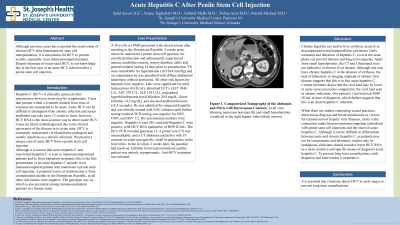Back


Poster Session A - Sunday Afternoon
Category: Liver
A0530 - Acute Hepatitis C After Penile Stem Cell Injection
Sunday, October 23, 2022
5:00 PM – 7:00 PM ET
Location: Crown Ballroom

Has Audio

Ariana R. Tagliaferri, MD
Saint Joseph's University Medical Center
Paterson, NJ
Presenting Author(s)
Sahil Zaveri, MD1, Ariana R. Tagliaferri, MD2, Gabriel Melki, MD2, Polina Aron, MD1, Patrick Michael, MD1
1St. Joseph's University Medical Center, Paterson, NJ; 2Saint Joseph's University Medical Center, Paterson, NJ
Introduction: Hepatitis C (HCV) is clinically quiescent after transmission; however, some may be symptomatic. Cases that present within a 6-month window from the time of exposure are considered to be acute. Acute HCV can be difficult to distinguish from chronic infection as serum antibodies can take up to 12 weeks to form; however, HCV RNA is the most accurate way to detect acute HCV. Cases are likely underdiagnosed due to the clinical quiescence of the disease in its acute state. HCV is commonly transmitted via blood-borne pathogens and usually manifests as a chronic infection. We present a unique case of acute HCV from a penile stem cell injection.
Case Description/Methods: A 58-yo M, no PMH presented with scleral icterus after traveling to the Dominican Republic 3-weeks prior, where he underwent a penile stem cell injection for erectile dysfunction and subsequently experienced nausea, nonbilious emesis, watery diarrhea, chills and general malaise lasting 14 days prior to presentation. VS were remarkable for hypertension (183/104 mm/Hg) and on examination he was jaundiced with diffuse abdominal tenderness without peritonitis. All other risk factors for hepatitis were negative. Labs were significant for mild leukocytosis (8.6 K/uL), abnormal LFT’s (ALT 1046 U/L, AST 570 U/L, ALP 163 U/L), conjugated hyperbilirubinemia (total bilirubin 20.8 mg/dL, direct bilirubin 14.3 mg/dL), and elevated prothrombin time (16.3 seconds). He was admitted for suspected hepatitis and was initially treated with NAC-infusion until further testing. PCR testing was negative for EBV, CMV, and HSV 1/2. His autoimmune markers were negative. Hepatitis A total Ab’s and anti-Hepatitis C were positive, with HCV RNA qualitative of 8050 IU/mL. The HCV PCR revealed genotype 1a. A portal vein U/S was unremarkable, and a CT abdomen and pelvis with IV contrast revealed non-specific, small hypodensities in the liver lobes. In the GI clinic 2 weeks later, his jaundice had resolved, bilirubin levels had normalized, and the patient was entirely asymptomatic. Anti-HCV treatment was initiated.
Discussion: Although previous cases have reported the reactivation of chronic HCV after hematopoietic stem cell transplantation, it is uncommon for HCV to present acutely, especially in an immunocompetent patient. Despite literature of reactivated HCV, to our knowledge this is the first case of an acute HCV infection after a penile stem cell injection. It is essential that clinicians detect HCV in early stages to prevent long-term complications.

Disclosures:
Sahil Zaveri, MD1, Ariana R. Tagliaferri, MD2, Gabriel Melki, MD2, Polina Aron, MD1, Patrick Michael, MD1. A0530 - Acute Hepatitis C After Penile Stem Cell Injection, ACG 2022 Annual Scientific Meeting Abstracts. Charlotte, NC: American College of Gastroenterology.
1St. Joseph's University Medical Center, Paterson, NJ; 2Saint Joseph's University Medical Center, Paterson, NJ
Introduction: Hepatitis C (HCV) is clinically quiescent after transmission; however, some may be symptomatic. Cases that present within a 6-month window from the time of exposure are considered to be acute. Acute HCV can be difficult to distinguish from chronic infection as serum antibodies can take up to 12 weeks to form; however, HCV RNA is the most accurate way to detect acute HCV. Cases are likely underdiagnosed due to the clinical quiescence of the disease in its acute state. HCV is commonly transmitted via blood-borne pathogens and usually manifests as a chronic infection. We present a unique case of acute HCV from a penile stem cell injection.
Case Description/Methods: A 58-yo M, no PMH presented with scleral icterus after traveling to the Dominican Republic 3-weeks prior, where he underwent a penile stem cell injection for erectile dysfunction and subsequently experienced nausea, nonbilious emesis, watery diarrhea, chills and general malaise lasting 14 days prior to presentation. VS were remarkable for hypertension (183/104 mm/Hg) and on examination he was jaundiced with diffuse abdominal tenderness without peritonitis. All other risk factors for hepatitis were negative. Labs were significant for mild leukocytosis (8.6 K/uL), abnormal LFT’s (ALT 1046 U/L, AST 570 U/L, ALP 163 U/L), conjugated hyperbilirubinemia (total bilirubin 20.8 mg/dL, direct bilirubin 14.3 mg/dL), and elevated prothrombin time (16.3 seconds). He was admitted for suspected hepatitis and was initially treated with NAC-infusion until further testing. PCR testing was negative for EBV, CMV, and HSV 1/2. His autoimmune markers were negative. Hepatitis A total Ab’s and anti-Hepatitis C were positive, with HCV RNA qualitative of 8050 IU/mL. The HCV PCR revealed genotype 1a. A portal vein U/S was unremarkable, and a CT abdomen and pelvis with IV contrast revealed non-specific, small hypodensities in the liver lobes. In the GI clinic 2 weeks later, his jaundice had resolved, bilirubin levels had normalized, and the patient was entirely asymptomatic. Anti-HCV treatment was initiated.
Discussion: Although previous cases have reported the reactivation of chronic HCV after hematopoietic stem cell transplantation, it is uncommon for HCV to present acutely, especially in an immunocompetent patient. Despite literature of reactivated HCV, to our knowledge this is the first case of an acute HCV infection after a penile stem cell injection. It is essential that clinicians detect HCV in early stages to prevent long-term complications.
Disclosures:
Sahil Zaveri indicated no relevant financial relationships.
Ariana Tagliaferri indicated no relevant financial relationships.
Gabriel Melki indicated no relevant financial relationships.
Polina Aron indicated no relevant financial relationships.
Patrick Michael indicated no relevant financial relationships.
Sahil Zaveri, MD1, Ariana R. Tagliaferri, MD2, Gabriel Melki, MD2, Polina Aron, MD1, Patrick Michael, MD1. A0530 - Acute Hepatitis C After Penile Stem Cell Injection, ACG 2022 Annual Scientific Meeting Abstracts. Charlotte, NC: American College of Gastroenterology.
